UK Warship Seized Missiles From Iranian Vessel Bound For Yemen
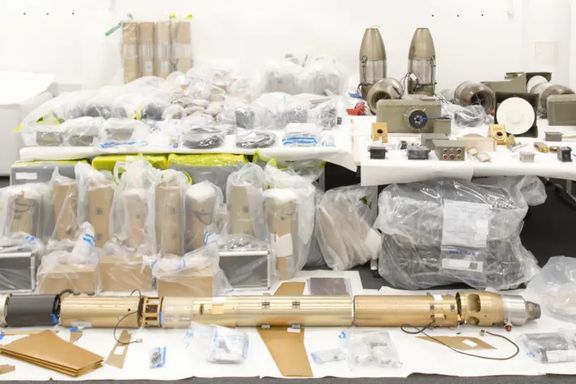
The UK defense ministry revealed on Thursday that the British Royal Navy seized cruise missiles from an Iranian vessel earlier this year in waters south of Iran.

The UK defense ministry revealed on Thursday that the British Royal Navy seized cruise missiles from an Iranian vessel earlier this year in waters south of Iran.
The seized packages were sent to the UK for technical analysis which later revealed that the shipment contained multiple rocket engines for the Iranian produced 351 land attack cruise missile and a batch of 358 surface-to-air missiles.
The 351, a cruise missile with a range of 1,000km, is regularly used by the Houthis to strike targets in Saudi Arabia and was also used in the January attack on Abu Dhabi, which killed three civilians.
The United Kingdom’s Embassy in the United Arab Emirates described the seizure as “the first time a British naval warship has interdicted a vessel carrying such sophisticated weapons from Iran”, yet another proof of Tehran’s support for Yemen’s Houthi rebels in the war-torn country.
Earlier in the month, the United Nations once again confirmed that missiles launched by Yeme’s Houthi militia at Saudi Arabia and the United Arab Emirates in the past two years were Iranian.
Noting that the UK will continue to work in support of an enduring peace in Yemen, Minister for the Armed Forces James Heappey said, “The UK is committed to upholding international law, from standing up to aggression in Europe to interdicting illegal shipments of weaponry that perpetuates instability in the Middle East.”
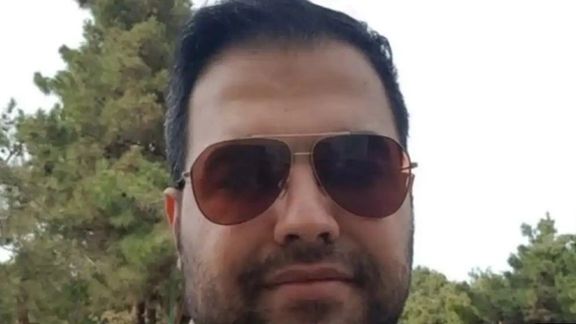
A court in Istanbul has sentenced several of the 14 accused of assassinating Iranian dissident Masoud Molavi-Vardanjani on behalf of Iranian intelligence.
In March 2020 Reuters reported that two senior Turkish officials had confirmed that two Iranian intelligence officers at Iran’s consulate in Istanbul had instigated the killing of Molavi-Vardanjani.
The court sentenced Turkish hitman, Abdulvahap Koçak, to life imprisonment for shooting Molavi-Vardanjani in Istanbul’s Şişli neighborhood in November 2019 while he was walking with Ali Esfanjani, an Iranian national who masterminded the assassination.
The court also sentenced Turkish nationals Cengiz Akin to a prison term of fifteen years, Veli Sarı to twelve years and Birol Özdemir to six months for assisting in the crime.
Iranian national Siavash Abazari Shalamzari was sentenced to two years and six months in prison on charges of forging official documents. The accused have the right to appeal their sentences.
Molavi-Vardanjani, a former Iranian intelligence operative and a civil engineer by education, fled to Turkey in 2018 and launched a Telegram channel, called Black Box, focused on corruption allegations against Iran’s extraterritorial Qods Force, top officials in the office of Supreme Leader Ali Khamenei, judges and other senior figures. “I will root out the corrupt clan commanders,” he wrote in one post, never updated after his death. “Pray that they don’t kill me before I accomplish this.”
The lawyer representing Molavi-Vardanjani’s family in Istanbul said in May that Iran’s security forces had confiscated his parents’ passports at Tehran’s International Imam Khomeini Airport to prevent them from traveling to Turkey to attend the court sessions.
The court has decided to investigate the cases of three Iranian nationals – Ali Esfanjani, Mohammadreza Naserzadeh, and Naji (Naci) Sharifi-Zindashti – separately and acquitted the remaining defendants, which has led to speculation that Ankara might have made a deal with Tehran to let some of the defendants off the hook.
Mohammadreza Naserzadeh, staff member of the Iran’s Istanbul consulate, was arrested in connection with Molavi-Vardanjani’s assassination in February 2021. He was accused of forging travel documents for the mastermind, Esfanjani, and helping him flee to Iran three days after the assassination.
The three Iranian nationals, including Sharifi-Zindashti, a well-known international drug trafficker and head of a cartel of the same name, have all fled or returned to Iran.
Sharifi-Zindashti has also been accused of assisting Iran’s intelligence ministry in the abduction of Habib Asyud (also known as Habib Chaab), an Iranian-Arab leading separatist, and delivering him to Tehran in November 2020, as well as the alleged killing of the Iranian fugitive judge Gholamreza Mansouri in the Romanian capital Bucharest in June 2020.
In December 2020, Turkish media reported that Turkish Intelligence had dismantled a network tied to Iran’s Intelligence Ministry that had abducted or assassinated dissidents, including Chaab.
Turkey has arrested dozens of Iranian and Turkish nationals in the past few years over alleged plots to kidnap or assassinate Iranian dissidents.
Last month Turkey said it thwarted a planned attack against Israeli tourists in Istanbul, and detained eight suspects allegedly working for an Iranian intelligence cell.
Turkey had reportedly warned that it was not prepared to allow Iran to use its territory to carry out acts of terrorism against other nations amid urgent Israeli warning to its citizens not to travel to Turkey for fear of abduction by Iran. Tehran said Israel had waged a psychological operation and a smear campaign against Iran to sabotage relations between Tehran and Ankara.
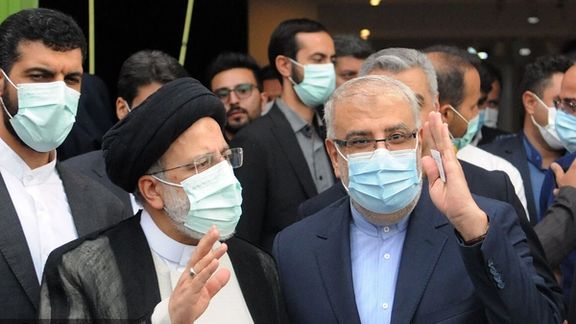
The Iranian government faced a serious problem in collecting revenues in the first 2 months of the calendar year, with oil income far from the expected amount.
The Supreme Accounting Office has released a report covering the period March 21- May 20 that shows except tax revenues, all other major sources of income grossly underperformed, which local media said was a serious warning for the government and the economy.
The government’s revenues from taxes, oil exports, customs duties, etc. totaled 880 trillion rials or about $3.5 billion (average free market exchange rate) in the 60-day period. This was just 37 percent of the projected budget revenues. However, it was forced to spend almost $5 billion in the same period. This was also about half of what the government had to spend, appropriating money to various ministries and provinces.
But the most notable number in the report is how little oil income was collected. While 79 percent of tax revenues were realized, only 15 percent of oil export income entered government coffers.
This is despite constant claims by Iranian officials that oil exports have increases by 40 percent in the past 12 months, which to a large extent correspond with what tanker traffic monitoring companies around the world have confirmed.
Iran’s budget was set with the expectation of 1.2 million barrels of oil exports per day. The consensus among observers is that Iran has shipped anywhere between 750,000 to close to a million barrels a day, while prices have spiked since the budget was approved. Therefore, oil export income should be close to what was set in the budget.
There could be a few explanations for the huge financial discrepancy mentioned in the Supreme Accounting Office report.
One possibility is that Iran is not receiving cash for the oil exports that largely end up in China. Many have mentioned barter trade, whereby Iran receives goods in lieu of the oil sent to China. The other possibility is that Beijing is keeping the money for now, given United States’ banking sanctions on Iran.
However, oil minister Javad Owji claimed on July 4 that Iran is receiving 80 of oil proceeds in cash and only 20 percent in barter. If this is true, then one can wonder where the money is and how it happened that the government got only 15 percent of what it expected.
This brings us to the second possibility. Cash collected from oil exports does not end up in government coffers and instead it is distributed to ‘revolutionary’ entities in Iran and abroad whose existence and operations are deemed essential for the regime, which is controlled not by parliament or presidential administrations, but by Supreme Leader Ali Khamenei.
It has always been known that the official government budget pertains to routine operations, such as civilian ministries and the large public-sector industrial companies, banks, etc.
The Revolutionary Guard, for example, has a nominal public budget appropriated by parliament, which is around $4-5 billion, but according to some estimates it spends at least $17 billion. The same is about secret expenditures to support military, intelligence and influence operations in Iraq, Syria, Lebanon and elsewhere.
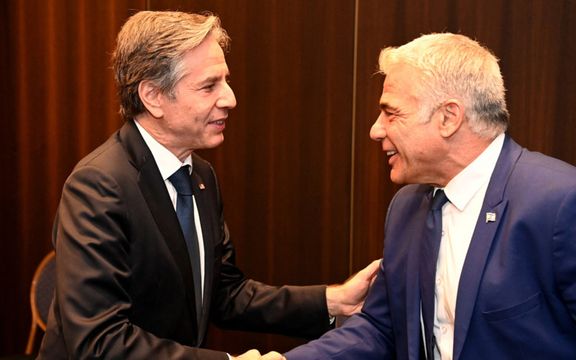
Saudi Arabia is reportedly considering a joint three-way meeting with the United States and Israel either during or after President Joe Biden's upcoming visit to the region.
A senior Saudi official said on Thursday that the kingdom may invite an Israeli representative for an unprecedented trilateral meeting, a possible sign that Riyadh may be willing to publicly acknowledge its warming, under-the-table ties with Israel.
Citing one of crown prince Mohammed bin Salman's advisors, the online outlet for the Israeli Yedioth Ahronot newspaper, Ynet, said the move is contingent upon the success of Biden's trip to the Middle East, especially the results of his visit to Riyadh.
The option of inviting a senior Israeli figure to join Biden's visit to Saudi Arabia was discussed before as part of the American-Saudi dialogue, but the chances of this scenario becoming reality seemed very slim. Jerusalem believes such a summit will serve the opportunity to secure "small-medium normalization measures" with Riyadh.
The news came as US Secretary of State Antony Blinken held a phone call with new Israeli Prime Minister Yair Lapid both to congratulate him on assuming the role and express US unwavering commitment to their partnership.
The US and Israel are seeking to lay the groundwork for a security alliance with Arab states that would use Israeli technology to connect their air defense systems to combat Iranian drone and missile threats, Reuters quoted sources familiar with the plan earlier in the day.
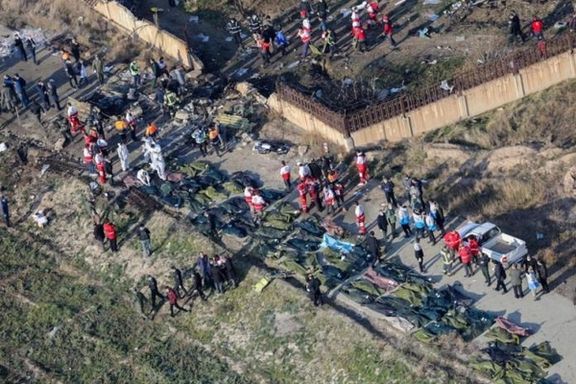
Ukraine International Airlines has sued the Islamic Republic and its Revolutionary Guard for the downing of its Flight PS752, which was hit by anti-air missiles in 2020.
In the official complaint filed in January with the Ontario Superior Court of Justice and recently obtained by Iran International, the airline requested $750 million in compensation for the passengers and crew and $250 million in damages.
“The plaintiff claims damages for the loss of life and baggage of passengers and crew and derivative claims of surviving family members in the amount of $750 million and damages for and arising from the loss of its aircraft in the amount of $250 million,” the document read.
In June, Canada announced that it has notified Iran of Ontario's Superior Court of Justice’s ruling that IRGC’s downing of the plane was intentional. In the case -- titled Zarei et al vs Islamic Republic of Iran et al – some family members filed a civil lawsuit against Iran and senior officials they believe were to blame for the incident.
The airliner was shot down by two air-defense missiles fired by the IRGC as it took off from Tehran’s Imam Khomeini International Airport. Hours earlier, the IRGC had fired more than a dozen missiles at Iraqi bases hosting US troops in retaliation for the killing of the IRGC Qods Force Commander Ghasem Soleimani who was targeted by a US drone strike just five days earlier. All 176 passengers and crew, including 63 Canadians and 10 from Sweden, as well as 82 Iranian citizens on the plane died in the disaster.

The Islamic Republic’s anti-riot police forces have been deployed to crack down on a protest rally by workers of a copper mine in northwestern Iran.
According to a video sent to Iran International, anti-riot forces are seen attacking the workers of the Sungun (Soungoun) copper mine complex, located in Varzaqan (Varzaghan) county in province of East Azarbaijan, who have been on strike for at least three days demanding better work conditions and salaries.
More than 1,200 workers of the mine -- the largest open-cast copper mine in Iran -- spent the last three nights inside their tents or cars at the site of the mining complex.
During the past few days several of the copper mine workers were arrested by security forces but the clampdown had not been so ferocious until Thursday.
Iran’s runaway inflation, currently at an annual rate of 55 percent, has impoverished a vast majority of the population and is seen as the result of a nuclear program that has brought on international and US sanctions for the past 15 years, crippling the economy.
With food prices rising faster after four years of United States’ ‘maximum pressure’ sanctions, Iranian workers and retirees have been holding regular protests or strikes to demand higher salaries. Last month, Iran’s currency fell to a historic low of 333,000 rials to the US dollar in June.
During the past weeks, widespread protests by workers,shop owners, and teachers protesting against poverty, inflation, and low wages, have been met with heavy-handed crackdown and numerous arrests by the security forces.